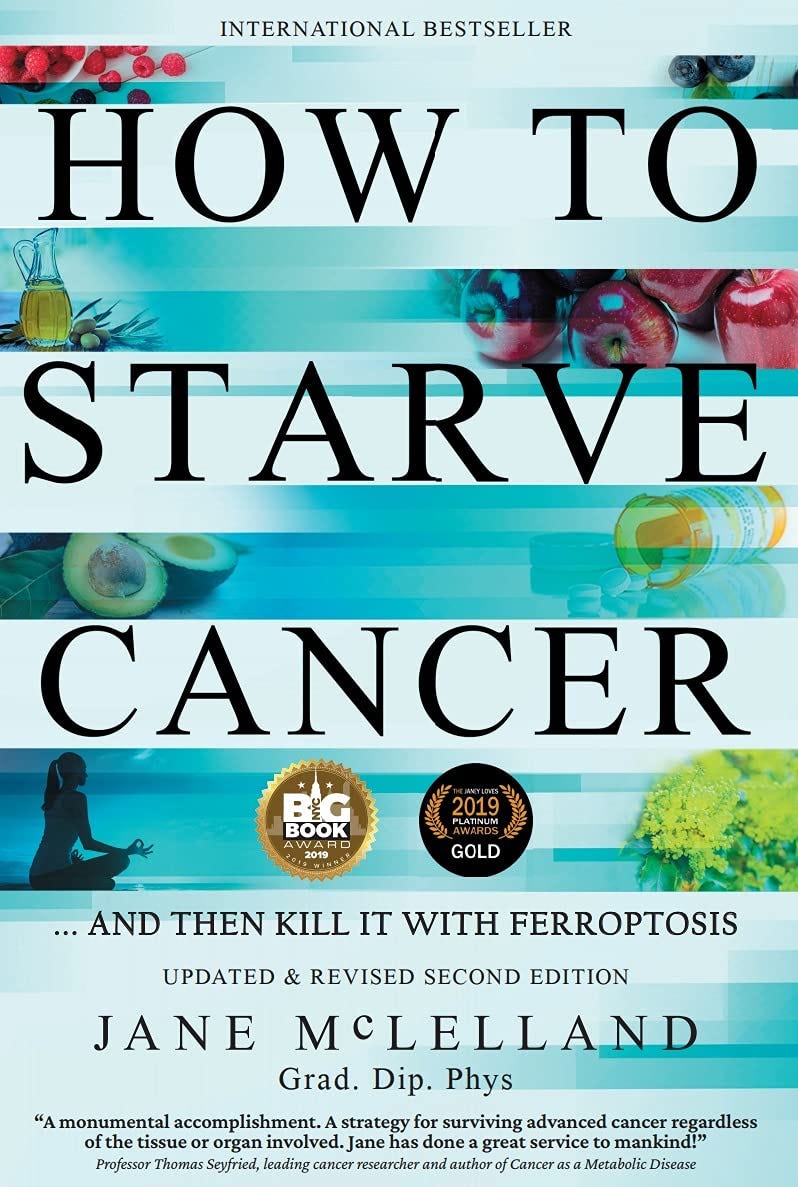Jane McLelland’s book “How to Starve Cancer Makes Bold Recommendations for Fighting Cancer with Diets and Supplements
If I Won't Do My Own Brain Surgery, Why Would I Do My Own Oncology?
Monday, March 27th, 2023 at 9:21 PM
Yorkshire Woods
Detroit, Michigan
I have been reading Jane McLelland’s book “How to Starve Cancer ...without starving yourself: The Discovery of a Metabolic Cocktail That Could Transform the Lives of Millions.” Jane McLelland fought lung cancer at age 35 more than twenty years ago. She has experienced no return of her cancer. She now teaches an online course in her method. Updated editions of her book have appeared. I am reading the Kindle edition.
I am reading the book at the encouragement of my friend, Nan, who underwent a surgery for her cancer today. I have yet to hear from her, but I am sure all went well. She underwent surgery at in Grand Rapids, trusting to the surgeons of a well-known cancer center. I notice that my friend has posted to Facebook in the last hour, so I’m taking that as a good sign. She posted a picture and a biography of Gloria Steinem. At first, I thought the early picture of Steinem was a picture of Nan.
Let’s look at a few takeaways for me at the half-point of the book.
First, I have started to take aspirin. I guess that’s a COX-2 inhibitor. I have to seriously look up what is COX-2. Does aspirin induce programmed cell death, or apoptosis, in cancer cells? Now there’s a question for a line-up on oncologists. McLelland recommend the dose that one takes as part of a regimen against heart attack. So what can it hurt? Well, it does affect the stomach lining. It can lead to GERD, Gastroesophageal Reflux Disease.
Second, I’m going to buy a batch of green tea, and maybe I’ll drink enough of it to replace my coffee intake. McLelland promotes the taking of oxidants, and green tea has an anti-oxidant effect. Again, what can it hurt?
Third, McLelland advocates using blood tests to know the level of cancer in your body. Our author trusted these blood tests as she worked out the metabolic cocktail she credits with saving her life. This testing happens routinely at the urologist, who administers a protein specific antigen test.
I’m hoping the author specifies exactly which blood test became her lodestone. Anything about a 150 worried her. Anything below a 150 gave her reassurance that her cocktails and interventions were working. After surgery to remove a cancerous tumor from her lung, the number shot up to six hundred. I believe this indicated to her that cancer cells were afoot after the surgery, looking for a place to attach and grow. I believe that she doubled down on aspirin and intravenous Vitamin C to make sure the cancer cells didn’t root?
Again, you are reading the writing of a business analyst reporting on a book by a former physiotherapist. Please conduct your own research and make your own choices. I offer this merely a book report, and a book report written by a person with no science background past high school physics.
Fourth, Linus Pauling exhausted his reputation by advocating intravenous Vitamin C as a chemotherapy alternative. McLelland takes up Pauling where the double Noble award winner left off. Our author makes it clear that intravenous Vitamin C saves the day, to her mind. C in a pill form doesn’t lessen the progress of cancer.
I wouldn’t conduct my own brain surgery, so why am I reading a do-it-yourself guide to cancer therapy? I’m hoping that I find a few practices that hinder my cancer rather than help it. Eating sugar can’t be helping because tumors love sugar. McLelland advocates for a low sugar diet. In fact, she begins to take berberine to aid in lowering blood glucose.
Berberine comes from a Chinese source, Mahonia aquifolium. The last time I took a Chinese remedy for a medical condition, I took two bottles of a root so poisonous, a pharmacist in New York City’s Chinatown wouldn’t provide it to me. It was too dangerous, and he didn’t even stock it
McLelland poses some rather interesting dilemmas that I might toss into a consultation with an oncologist. I would say this, assuming that I understood the author correctly. “If only the immune system can kill the cancer stems cells, why do we administer chemotherapy that dulls and maybe even kills off the immune system?”. A question that our author attempts to answer might make a good one for the oncologist. “How does cancer cloak itself to the white cells that could destroy it. And how does one pull the mask off of a tumor so that immune cells go to work on it?”
I’m going to keep reading McLelland’s book because it does give me a vocabulary for understanding my condition. Plus, I promised Nan that I would read it and discuss it with her. I’m hoping to walk away with dietary ideas to keep my blood sugar low as possible. I’m hoping that McLelland finally gives a simple how to do what worked for her.
I’m betting that my friend Nan has the discipline to follow it to the letter.




